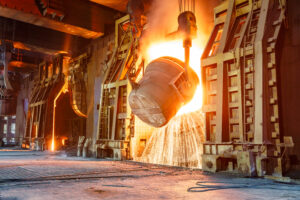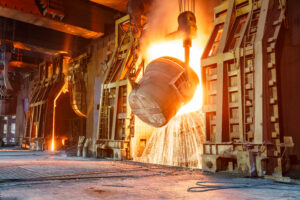
The first 260 job cuts have been announced by British Steel in what is feared will be the first of many more redundancies at the Scunthorpe-based steelmaker.
Its 4,200 workers, spread across five facilities on Humberside, in Yorkshire and in the northeast of England, are growing increasingly uneasy over their futures amid talk that a quarter of them could be laid off in further rationalisations by British Steel.
Unions are threatening strike action unless the company’s owner, Jingye, of China, starts communicating and negotiating on its plans with the workforce. Instead, they have been told by British Steel to expect further news of actions “to streamline our business” and “other potential cost-saving measures across the business” to be announced “in due course”.
The UK industry is in crisis after crude steel production in the country — Scunthorpe is second only to Port Talbot in south Wales in output — slumped to its lowest levels in the 90 years since the Great Depression.
Jingye, which was gifted the business by the government on the promise of £1.2 billion of investment from the Chinese company after the sprawling Scunthorpe steelworks went into receivership in late 2019, said yesterday that it was going to close the plant’s coking ovens. Coking ovens play a central role in the production of crude steel, creating the coke from coal to fire up the blast furnaces.
British Steel said it was closing the ovens with the loss of 260 jobs because it needed to cut its fuel bill and to reduce its carbon emissions penalties. It said its energy bill had risen by £120 million last year and that its carbon emission penalties had gone up by £70 million.
The failure to explain what future Scunthorpe has without the coking ovens and what further cuts are coming prompted Community, the steelworkers’ union, and Unite, the industrial union, to threaten strike action unless British Steel provided more information on its plans .
Xi Feng Han, 44, a Jingye director who is British Steel’s chief executive, said the company was facing up to the problem of how to take carbon out of its production process. “Jingye is committed to our long-term future, but decarbonisation is a major challenge for our business and, like most companies, we’re facing significant challenges because of the economic slowdown, rising inflation and exceptionally high energy prices,” he said. “We’re undergoing the biggest transformation in our 130-year history.”
He blamed British Steel’s financial woes and its recent call for the government to inject £300 million of support on an uncompetitive UK steel market.
Read more:
British Steel announce first 260 jobs to go at Scunthorpe plant with many feared to follow

